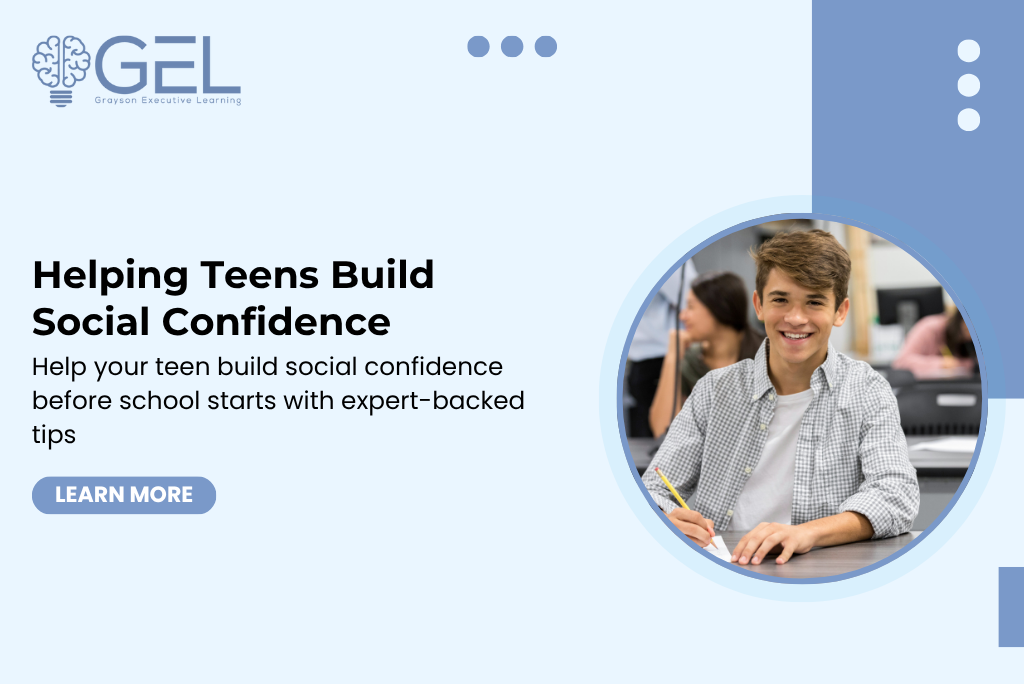Your teen is smart, capable, and full of potential. But that doesn’t mean the start of a new school year is easy. Maybe they’re dreading walking into a classroom where they don’t know anyone. Maybe they’re worried about lunch period, group projects, or what happens if they say the wrong thing.
For teens, especially those with ADHD or executive function challenges, these everyday moments can feel overwhelming. And for parents, it’s difficult to watch your teen retreat socially when you know how much they want connection.
The good news? Social confidence isn’t an innate trait. It’s a skill. And like any skill, it can be learned, practiced, and strengthened with the right tools and support.
Why Social Confidence Matters for Teens
Social confidence impacts far more than friendships. It plays a key role in how teens engage academically, manage stress, and interact with the world around them.
Teens with strong social skills are more likely to:
- Participate in classroom discussions
- Ask for help when they need it
- Manage conflict in healthy ways
- Form meaningful relationships
- Experience higher emotional well-being
In fact, research links social competence in adolescence with better academic performance, greater life satisfaction, and reduced risk of mental health challenges like anxiety and depression. Socially confident teens are also more resilient when faced with setbacks or rejection. They’re more willing to try new things, persist through challenges, and bounce back from disappointment.
By contrast, teens who struggle socially may avoid group activities, hesitate to share ideas in class, or interpret peer rejection as a personal failure. This can lead to isolation, low self-esteem, and a cycle of avoidance that only deepens the struggle.
Signs Your Teen May Be Struggling Socially
Not every teen will tell you when they’re having a hard time. But there are red flags that suggest a teen may be struggling with social confidence:
- Withdrawal from friends or group activities
- Reluctance to join clubs, teams, or school events
- Excessive screen time replacing in-person interaction
- Avoidance of eye contact or small talk
- Negative self-talk about their social skills
You might notice they gravitate toward solitary hobbies, dread social events, or struggle to interpret facial expressions and tone of voice. In some cases, they may appear irritable or overly self-critical, especially after a difficult social situation.
If these signs sound familiar, you’re not alone. And with the right support, progress is absolutely possible.
Strategies to Build Social Confidence Before the School Year Starts
A new school year brings fresh social dynamics, making it the perfect time to start building confidence now. Here are a few simple, practical ways to get started:
1. Practice Social Skills at Home
The best way to build social confidence is through practice in safe, low-pressure environments. That might mean role-playing conversations, rehearsing how to greet someone new, or practicing how to join a group discussion.
You can also use everyday tasks as opportunities to build confidence. For example, have your teen order food at a restaurant, ask a question at the store, or greet a neighbor. These small moments help build the skills they’ll need in larger social settings.
2. Focus on Effort, Not Just Results
Teens need to know that the goal isn’t to have flawless conversations or win over every peer. The real growth comes from the effort. Whether it’s saying hello to a new classmate or trying out for a team, praise your teen for taking a step forward.
A teen who learns to say “I gave it a try” instead of “I failed” is building both resilience and confidence. This mindset shift fosters emotional regulation and supports long-term growth.
3. Create Opportunities for Positive Social Experiences
Structured activities like sports, clubs, or volunteering allow teens to interact with others in a consistent and predictable way. These environments offer built-in routines, shared goals, and regular peer contact, which can all help ease anxiety and build confidence.
Research shows that teens who engage in diverse activities are less likely to feel discouraged by setbacks in any one area. Social confidence grows when they feel a sense of purpose, responsibility, and belonging.
4. Model Confidence in Your Own Life
Your teen is watching how you handle challenges. If you’re facing something difficult at work or in your community, talk through your process out loud. Share how you’re preparing, what you’re nervous about, and how you’re choosing to move forward anyway.
This kind of modeling shows that confidence isn’t about being fearless. It’s about making a plan and following through, even when the outcome is uncertain.
5. Ease Into the Back-to-School Transition
New school years come with a wave of social unknowns. Help your teen reduce anxiety by visiting the school ahead of time, walking their route, or attending orientation events. Practice navigating their schedule, meeting teachers, and finding familiar faces.
Reinforce that the goal is not to feel fully comfortable on day one but to build comfort over time. These small proactive steps lay the groundwork for smoother social transitions once the year begins.
Helping Teens Reframe the Story They Tell Themselves
Confidence is more than what teens show outwardly. It’s the internal belief that they are worthy of connection, capable of learning, and resilient in the face of challenge.
That belief can be shaky, especially for teens with ADHD or executive function difficulties. They may misread social cues or struggle to bounce back from a negative experience. In those moments, self-compassion becomes a powerful tool.
Encourage your teen to speak to themselves the way they would a friend:
- “It’s okay that this felt awkward. I’m still learning.”
- “Not every conversation will go perfectly. That’s normal.”
- “Trying matters more than getting it right the first time.”
Practicing this kind of internal dialogue not only reduces stress but also builds emotional resilience.
Confidence Starts With One Small Step
Social confidence doesn’t develop overnight, but it does grow with practice, encouragement, and consistent support. Whether it’s joining a club, introducing themselves to a new classmate, or just showing up, every effort matters.
As a parent, you don’t have to fix every challenge. Instead, create space for your teen to try, reflect, and grow. Celebrate their effort, listen to their concerns, and model what it means to keep moving forward.
Because ultimately, the goal isn’t to raise a teen who never struggles. It’s to raise a teen who knows they can handle the struggle and come out stronger on the other side.
How Can GEL Help Students Develop Executive Function?
Grayson Executive Learning (GEL) is a boutique Academic and ADHD/Executive Function Coaching practice that specializes in providing premium one-on-one academic coaching services to high school and college students with ADHD and executive function difficulties.
Click here to learn how we can help your student truly reach their academic potential while developing critical life and independence skills.
We look forward to serving you!


